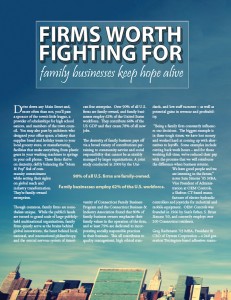This article first appeared in the UConn Business magazine, Volume 2, Issue 1 (Fall 2010)
 Family Business Keep Hope Alive
Family Business Keep Hope Alive
Drive down any Main Street and, more often than not, you’ll pass a sponsor of the town’s little league, a provider of scholarships for high school seniors, and members of the town council. You may also pass by architects who designed your office space, a bakery that
supplies bread and holiday treats to your local grocery store, or manufacturing facilities that make everything from plastic gears in your washing machines to springs in your cell phone. These firms thrive on dexterity, deftly balancing the “Mom & Pop” feel of community
commitment while setting their sights on global reach and industry transformation.
They’re family-owned enterprises. Though common, family firms are nonetheless unique. While the public’s heads are turned to grand scale of large publicly-held multinational organizations, family firms quietly serve as the brains behind global innovations, the heart behind local, national, and international philanthropy, and the central nervous system of American free enterprise. Over 90% of all U.S. firms are family-owned, and family businesses employ 62% of the United States workforce. They contribute 64% of the US GDP and they create 78% of all new jobs.
The dexterity of family business pays off via a broad variety of contributions pertaining to community service and social responsibility that cannot be as nimbly managed by larger organizations. A joint study conducted in 2009 by the University of Connecticut Family Business Program and the Connecticut Business & Industry Association found that 80% of family business owners emphasize their family values in the operation of the firm, and at least 79% are dedicated to incorporating socially responsible practices in their business. This all contributes to quality management, high ethical standards, and low staff turnover – as well as potential gains in revenue and profitability. “Being a family firm constantly influences our decisions. The biggest example is in these tough times; we have lost money and worked hard at coming up with alternatives to layoffs. Some examples include cutting back work hours – and for those working full-time, we’ve reduced their pay with the promise that we will reimburse the difference when business returns. We have good people and we are investing in the future,” notes Sam Simons ’95 MBA, Vice President of Administration at OEM Controls, a Shelton CT-based manufacturer of electro-hydraulic controllers and joysticks for industrial and mobile equipment. OEM Controls was founded in 1966 by Sam’s father, S. Brian Simons ’60, and currently employs over 200 Connecticut residents.
Greg Bachmann ’03 MBA, President & CEO of Dymax Corporation – a 2nd generation Torrington-based adhesives manufacturer – adds, “What comes around goes around. Most of our donations go toward education, and on top of that we reimburse employees 100% for tuition. Our return is having the educational institutions to turn to for a strong employee base as well as a highly skilled, educated work force with a higher degree of job satisfaction, loyalty and self satisfaction. Non family firms tend to be short-term driven
by shareholders who do not live in nearby communities. Philanthropy generally requires a longer term perspective outside of simple shareholder return.”
While the return on investment in social responsibility contributes significantly to the intrinsic value of a company, the benefits can’t just be measured quantitatively, “The return on being socially responsible and philanthropic not only gives you a warm feeling of having helped others but it’s also part of the responsibility of owning a successful company in your community. It is important to have our family involved in giving back to the community
and taking part in making a positive difference in the lives of others,” notes John G. Sommers, President & CEO of Allied Printing Services, Inc. Allied Printing is a Manchester-based 3rd generation family firm and is one of the largest independent, financial and commercial printing companies in the country.
“My father always said ‘take care of the company and it will take care of everyone who works there’ – and that still stands true for us today at Allied. As a family-run business, we are in it for the long haul. We don’t have to worry about how the stock market reflects on any decisions that we make. We truly have a commitment to our employees, community and family to run a successful business. Being a second/third generation family-owned
business means that we have been raised with the values and principles that Allied was built upon, and we are instilling those values in our people.”
Family business’s contributions are not going unnoticed. The 2009 UConn/CBIA study found that 82% of family firms donate regularly to community organizations, educational initiatives, and religious institutions. The philanthropy of family firms provides a boost to the community and critical support to the education efforts of the future workforce.
“UConn’s partnership with family firms is strong and recognized in labs and classrooms across campus,” notes Brian J. Otis ’06 MBA, Vice President of Development at the UConn Foundation. “Whether it is supporting teaching, research, or outreach, we’re grateful for the support and proud to work with each and every family and business. As vital stakeholders, family firms help us achieve comprehensive learning models whereby each student can develop into a productive global asset.”
John Sommers emphasizes this partnership: “Education is important to us and is something in which the entire community must invest. The benefits are amazing – education has the power to reduce crime, increase investment, and raise productivity. I’ve seen firsthand that by employing teenagers during the summer, at some time in the future they may become full-time employees. Education has a high correlation with increased earning potential in the United States and sends a message to young people that they are important and an essential part of our society.”